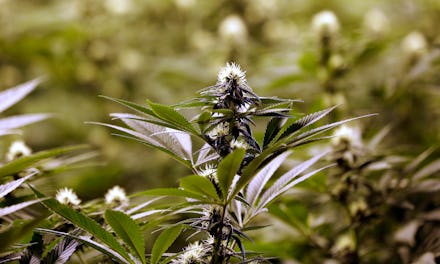South Dakota Santee Sioux Tribe to Open Nation's First Marijuana Resort

Ever want to just take a weekend getaway where you lounge around, hit up a casino and light up a joint?
The Santee Sioux tribe of Flandreau, South Dakota, has unveiled plans to open a "marijuana resort" in what will be the nation's first dedicated facility for marijuana tourism. The tribe is currently aiming to open the resort by the year's end, potentially creating a blueprint for other such projects across the nation while simultaneously creating an opportunity to generate much-needed revenue for the tribe.
The Associated Press reports the planned resort will encompass a marijuana farming operation, a smoking lounge where the weed will be sold, a nightclub and eventually even slot machines and an outdoor performance venue. Buyers will have to keep all marijuana on the reservation, and the marijuana will come pre-packaged in 1-gram packages that will be sold for $12.50 to $15 apiece.
Revenue will fund various projects on the reservation, including an addiction treatment center and a day care for workers. Marijuana is already being grown with hopes to begin sales by December.
"We want it to be an adult playground," the tribe's president, Anthony Reider, told the AP. "There's nowhere else in American that has something like this ... [The tribe must] look at these opportunities because in order to preserve the past, we do have to advance in the present."
The tribe already runs numerous facilities for tourists on its land, including a casino, ranch and hotel. That's pretty par for the course for Native tribes, which hold limited sovereignty over their own reservations. However, in recent years, many tribes have begun diversifying their revenue streams out of the casino business into ventures like construction firms, marketing and advertising companies and financial holding companies, NPR reports.
But isn't marijuana illegal? In most states, yes. But the Santee Sioux will be able to proceed with the project thanks to a 2014 Justice Department directive protecting Native American tribes from prosecution for participation in the marijuana trade.
That's all well and good. But the decision isn't without its risks, including the possibility a future president will direct the Justice Department to resume those prosecutions. Just like in Colorado, Oregon, Washington, Alaska and Washington, D.C., where marijuana legalization initiatives have succeeded and resulted in a thriving weed economy, growers, sellers and users are only safe so long as an administration with a loose attitude towards pot is in power.
Public opinion, which has swung widely in favor of legal weed in recent years, probably makes a crackdown unlikely. But Native tribes are still subject to federal law, and a tough-on-weed president like New Jersey Gov. Chris Christie, the only presidential candidate to come out hard against legal weed, could turn the Santee Sioux's plan into a legal nightmare.